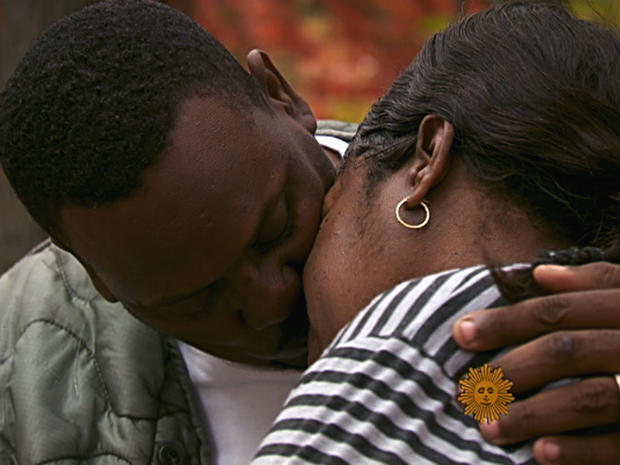America's new poor
While most of us are already looking forward to our Thanksgiving feast, one in six Americans isn't sure where their next meal will come from. And as Mark Strassmann tells us . . . we're finding the hungry in some unexpected places:
In Forsyth County's rolling subdivisions near Atlanta, Easy Street seems to run forever. What recession? The average household here earns $88,000 - the highest in Georgia, 13th highest in America.
But for more families here, prosperity is a pretense. The job's lost, the savings are gone, and the big house is either in foreclosure or on its way. And just keeping food on the table is a struggle.
So Forsyth's newly-needy file into local food banks.
Yesterday's GIVERS have become today's TAKERS.
"People lost their jobs and went from great incomes to no incomes," said Sandy Beaver, Sandy Beaver leads The Place, Forsyth County's biggest non-profit center for social services. She calls those who visit The Place "the new poor."
The Place's main mission: Feed the hungry.
"Who are the new poor in this county?" asked Strassmann.
"The new poor could be you, me, your neighbor, your church member, somebody who has been affected by the economy," she said. "Many of our people who have come for assistance used to be our donors. And they'll say, 'I never thought I'd have to do this, never in my wildest dreams.'"
"People who two, three four years ago, the hunger would have been unimaginable?" asked Strassmann.
People like these married retirees in their 70s, too embarrassed to appear on camera. They said they could not feed themselves snow without help.
They retired comfortably in their early 50s. But now, after bad investments, a ruined portfolio, and costly medical issues, they qualify for food stamps - and could lose the house.
"Taking the food was really tough," the woman said. "The hard part was, we used to give it, and now I'm taking it back, you know?" she said, crying.
Nearly 15 percent of Americans are now receiving food stamps, a record level, and a jump of about two-thirds since 2007.
One in SIX Americans - 49 million people - say they have trouble putting food on the table.
At Forsyth County's Lambert High, eight percent of kids now get free lunch, double the number three years ago.
Gladys Sasso-Alvarez directs the district's help for needy students: "Sometimes they feel embarrassed that they are getting free breakfast and lunch. They think no one will know about it. But it was something deep inside of them, you know - they feel it is an embarrassment to eat for free."
Forsyth and its neighboring counties have also seen a spike in another group of the new needy: People like Raymond and Alexa Price.
He's a retired soldier, a combat vet who came home from Afghanistan last year with severe PTSD.
"All I want is a job. I don't really want anybody's handouts," Raymond Price said.
She's nine months pregnant. Neither can work. They also support her 16-year-old son, all on government benefits of $1,600 a month.
"The freezer's really bare," said Alexa Price. "We just - we do what we can. We do what we can, to try to make it stretch and last."
The Prices came last week for a box of non-perishables handed out by Atlanta Falcon football players. They were volunteering for Operation Homefront, a group that helps feed military families
Any day now, the Prices will have the joy of a baby daughter - and the stress of one more mouth to feed.
In Forsyth yesterday, cars lined up for donated Thanksgiving food.
It's one more sign this Thanksgiving week that hard times have come to Easy Street.
"There's still people losing jobs every day," said Sandy Beaver. "There's still people losing homes every day. And I always wonder, where do they do? When they lose a home, where do they go? 'Cause we don't always see them after that."
For more info:
